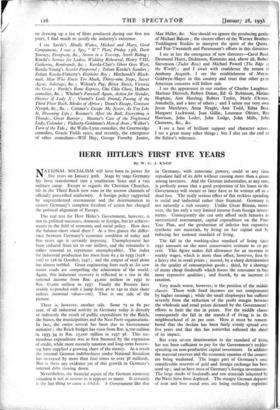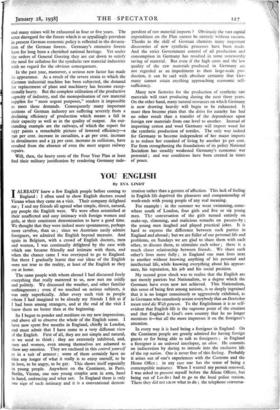HERR HITLER'S FIRST FIVE YEARS
By W. G. J. KNOP
NATIONAL SOCIALISM will have been in power for five years on January 3oth. Stage by stage Germany has been transformed into a totalitarian State and a vast military camp. Except as regards the Christian Churches, life in the Third Reich now runs in the narrow channels of officially prescribed uniformity. A foreign policy supported by unprecedented rearmament and the determination to restore Germany's complete freedom of action has changed the political alignment of Europe.
The real test for Herr Hitler's Government, however, is not its political successes, domestic or foreign, but its achieve- ments in the field of economic and social policy. How does the balance-sheet stand there ? At a first glance the differ- ence between Germany's economic condition of today and five years ago is certainly imposing. Unemployment has been reduced from six to one million, and the remainder is either seasonal or represents unemployables. The index for industrial production has risen from 61.5 in 1933 (1928 too) to 526 in October, 5937 ; and the output of steel alone has almost trebled. Great engineering feats such as the Hew motor roads are compelling the admiration of the world. Again, this industrial recovery is reflected in a rise in the national income from Rm. 45,00o million in 1932 to Rm. 67,00o million in 1937. Finally the Bourses have readily responded with a jump from 46 to 14o in their share indices (nominal value—too). That is . one side of the picture.
There is, however, another side. Some 75 to 8o per cent. of all industrial activity in Germany today is directly or indirectly the result of public expenditure by the Reich, the States, the municipalities and the Nazi Party organisations. In fact, the entire revival has been due to Government initiative ; the Reich budget has risen from Rm. 9,70o million in 1933-34 to Rm. 25,00o million in 1937-38. This tre- mendous expenditure was at first financed by the expansion of credit, while more recently taxation and long-term borrow- ing have supplied a growing share of the money. As a result the internal German indebtedness under National Socialism has increased by more than four times to over 38 milliards. Nor is there any evidence yet of this growth in Germany's internal debt slowing down. - Nevertheless, the financial aspect of the German economic situation is not as serious as it appears to many. It certainly is the last thing to cause a debacle. A Government like that in Germany, with autocratic powers, could at any time repudiate half of its debt without causing more than a groan among investors. And the German industrialist, at any rate, is perfectly aware that a good proportion of his loans to the Government will sooner or later have to be written off as a dead loss. The really serious effect of this reckless spending is social and industrial rather than financial. Germany is not naturally a rich country. Unlike Great Britain, more- over, she has only a very limited income from foreign invest- ments. Consequently she can only afford such luxuries as unrestricted rearmament, capital expenditure on the Four Year Plan, and the production of inferior but, expensivp synthetic raw materials, by living on her capital and by reducing her national standard of living.
The fall in the working-class standard of living since 1932 amounts on the most conservative estimate to so per cent. This figure makes full allowance for an increase in weekly wages, which is more than offset, however, first by a heavy rise in retail prices ; second, by a sharp deterioration in the quality of consumption goods ; third, by a shortage of many cheap foodstuffs which forces the consumer ,to-buy more expensive qualities ; and fourth, by an increase -in taxation.
Very much worse, however, is the position of the middle classes. Those with fixed incomes are not compensated by higher earnings ; while the small shopkeeper has suffered severely from the reduction of the profit margin between the wholesale and retail prices dictated by the Government's efforts to limit the rise in prices. For the middle classes consequently the fall in the standa:d of living is in the neighbourhood of 20 per cent.. Here it must be remem- bered that the decline has been fairly evenly spread over five years and that this has somewhat softened the shock of its impact.
But even severe deterioration in the standard of living has not been sufficient to pay for the. Government's reckless spending on non-productive capital investment. In addition the material reserves and the economic stamina of the country are being weakened. The larger part of Germany's once considerable reserves of gold and foreign exchange has been used up ; and so have most of Germany's foreign investments. The large stocks of foodstuffs and raw materials inherited-by the Nazis have been depleted: The meagre German deposits of iron and base metal ores are being ruthlessly. exploited and many mines will be exhausted in four or five years. The utter disregard for the future which is so appallingly prevalent in present German economic policy is reflected in the devasta- tion of the German forests. Germany's extensive forests have for long been a cherished national heritage. Yet under the orders of General Goering they are cut down to satisfy the need for cellulose for the synthetic raw material industries with no regard for the obvious consequences.
In the past year, moreover, a serious new factor has made its appearance. As a result of the severe strain to which the German industrial machine has been subjected, the demand for replacement of plant and machinery has become excep- tionally heavy. But the complete utilisation of the productive capacity of industry, and the monopolisation of raw material supplies for " more urgent purposes," renders it impossible to meet these demands. Consequently many important sections of German industry are suffering severely from a declining efficiency of production which means a fall in their capacity as well as in the quality of output. An out- standing example are the railways, of which the report for 1937 paints a remarkable picture of lowered efficiency—a t90 per cent. increase in casualties, a 40 per cent. increase in derailments and a 33 per cent. increase in collisions, have resulted from the absence of even the most urgent railway repairs.
Will, then, the heavy costs of the Four Year Plan at least find their military justification by rendering Germany inde- pendent of raw material imports ? Obviously the vast capital expenditure on the Plan cannot be entirely without success. Thanks to the skill of German chemists many important discoveries of new synthetic processes have been made. And the strict Government control of all production and consumption in Germany has resulted in some noteworthy saving of material. But even if the high costs and the low quality of the raw materials produced in Germany are not regarded as an impediment to their large-scale pro- duction, it can be said with absolute certainty that Ger- many cannot attain anything approaching economic self- sufficiency.
Many new factories for the production of synthetic raw materials will start producing during the next three years. On the other hand, many natural resources on which Germany is now drawing heavily will begin to be exhausted. It must then become plain that the drive for autarky has had no other result than a transfer of the dependence upon foreign raw materials from one level to another. Instead of importing cotton and wool Germany will import wood for the synthetic production of textiles. The only way indeed for Germany to become independent of her major imports is to reduce her standard of living by another 3o per cent. Far from strengthening the foundations of its policy National Socialism has steadily weakened Germany's economic war potential ; and war conditions have been created in times of peace.



















































 Previous page
Previous page